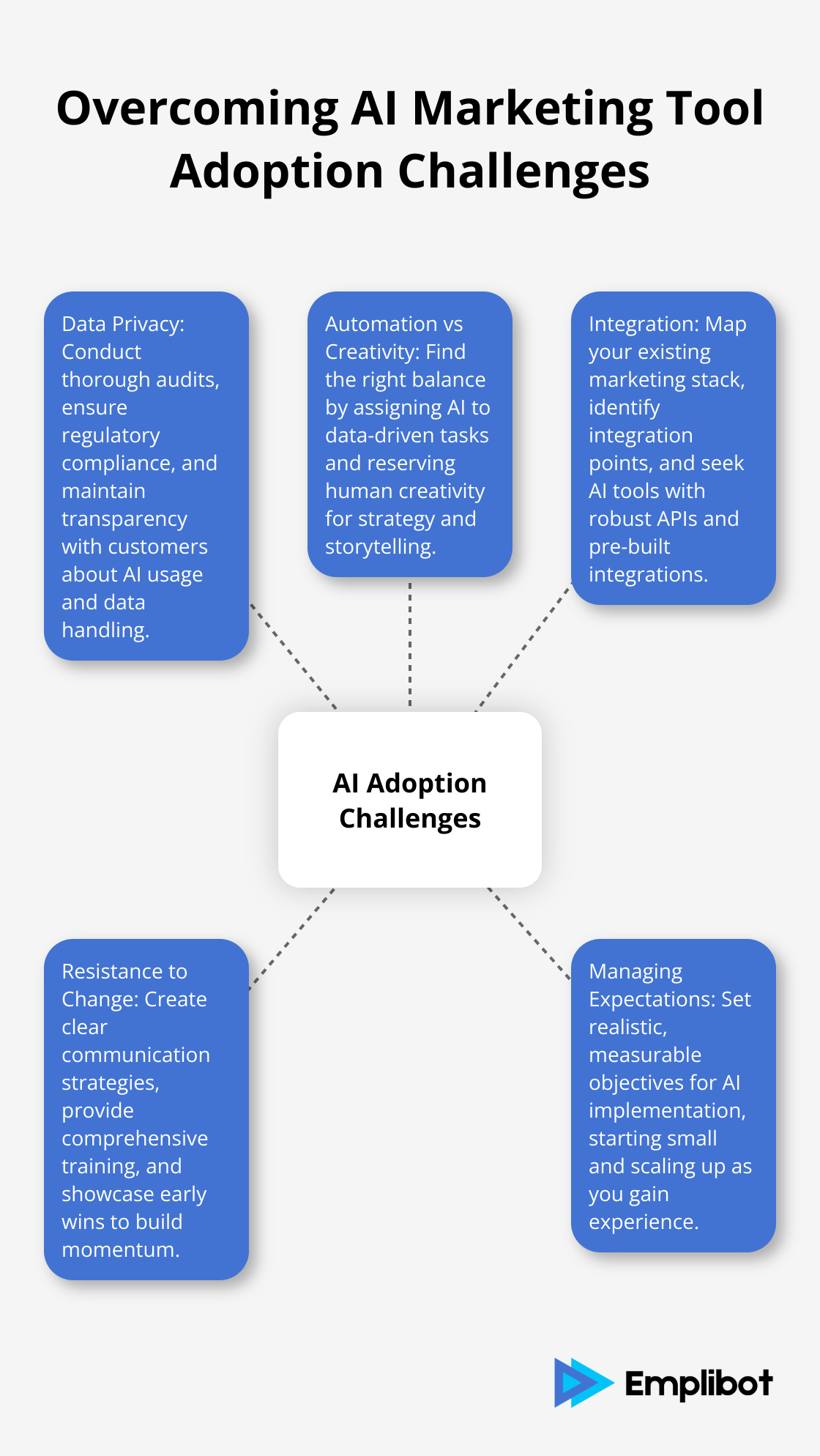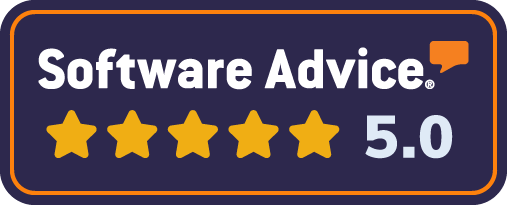AI marketing tools are revolutionizing the way businesses connect with their audiences. These powerful technologies are transforming campaign strategies, boosting engagement, and driving unprecedented results.
At Emplibot, we’ve seen firsthand how AI-driven solutions can supercharge marketing efforts. In this post, we’ll explore the top AI marketing tools and share best practices for implementation, helping you stay ahead in today’s competitive landscape.
Contents
ToggleWhich AI Tools Supercharge Marketing Campaigns?
AI marketing tools are transforming how businesses approach their campaigns. Let’s explore some of the most impactful AI tools that revolutionize campaign optimization.
Content Creation at Scale
AI has advanced content creation significantly. Tools like Jasper AI and Copy.ai change the game for marketers. These platforms generate high-quality blog posts, ad copy, and social media content in minutes, saving hours of work. A study by Accenture reveals that 84% of C-level executives believe they won’t achieve their business strategy without scaling AI. This holds particularly true in content marketing, where AI tools produce large volumes of targeted content quickly.

Personalization Engines
Personalization is no longer a luxury-it’s an expectation. AI-powered personalization engines like Dynamic Yield and Optimizely help marketers deliver tailored experiences to each customer. These tools analyze user behavior, preferences, and historical data to create personalized product recommendations, email content, and website experiences. A report by Epsilon found that 80% of consumers are more likely to make a purchase when brands offer personalized experiences.
Predictive Analytics for Customer Insights
Predictive analytics tools give marketers unprecedented insights into customer behavior. Platforms like Salesforce Einstein and IBM Watson Analytics use machine learning algorithms to forecast customer actions, identify potential churn, and optimize marketing spend. These insights allow marketers to make data-driven decisions and allocate resources more effectively. A study by McKinsey found that companies using AI for marketing saw up to a 30% reduction in customer acquisition costs.
AI-Powered Chatbots
AI chatbots have evolved from simple rule-based systems to sophisticated conversational agents. Tools like MobileMonkey and ManyChat enable businesses to provide 24/7 customer service, qualify leads, and even make sales directly through chat interfaces. According to a report by Juniper Research, chatbots will save businesses $8 billion annually by 2025.
Automated Content Distribution
AI tools (like Emplibot) automate the distribution of content across various platforms. These tools handle everything from keyword research to content creation and SEO optimization. They produce high-quality, engaging content tailored to your business and distribute it across platforms like LinkedIn, Facebook, and Twitter. This automation saves time and resources while increasing traffic, leads, and sales.
While these AI tools offer tremendous potential, it’s crucial to combine them with human creativity and strategic thinking. The best results come from a balanced approach that leverages AI capabilities while maintaining a human touch in marketing campaigns. As we move forward, let’s explore how to implement these AI marketing tools effectively in your campaigns.
How to Implement AI Marketing Tools Effectively
Define Your Marketing Goals
Before you select AI tools, establish clear marketing objectives. Do you want to boost lead generation, enhance customer engagement, or streamline content creation? Your goals will guide your tool selection and implementation strategy. Organizations are most often using generative AI in marketing and sales, product and service development, and service operations.
Select the Right Tools
Not all AI marketing tools offer equal benefits. Evaluate your current marketing stack and identify gaps that AI can fill. If personalization is your challenge, consider tools like Dynamic Yield or Optimizely. For predictive analytics, Salesforce Einstein or IBM Watson Analytics might suit your needs better. Businesses that choose AI tools aligned with their specific needs see a 30% increase in marketing ROI (as reported by Gartner).
Train Your Team
Your team’s proficiency with AI tools can determine the success of your implementation. Invest in comprehensive training programs. This involves more than just teaching tool usage; it requires helping your team understand underlying AI concepts. Companies that invest in AI training for their marketing teams experience a 17% higher success rate in AI implementation (according to a Deloitte study).
Start Small, Then Expand
Avoid overhauling your entire marketing strategy at once. Begin with a pilot project in one area of your marketing. This approach allows you to learn, adjust, and prove AI’s value before scaling up. You might start by using AI for email subject line optimization before expanding to full-scale content creation. Companies that take this approach are 50% more likely to capture value from AI (as reported by McKinsey).

Monitor and Optimize Continuously
AI tools require ongoing attention and optimization. Establish key performance indicators (KPIs) to track the impact of your AI tools. These might include metrics like conversion rates, engagement levels, or time saved on tasks. Review these metrics regularly and adjust your AI strategy accordingly. Marrying data and AI strategies and bringing business and technical expertise together are important for successful AI implementation.
As you implement these strategies, remember that AI should enhance, not replace, human creativity in marketing. The next section will explore how to overcome common challenges in AI marketing tool adoption, ensuring a smooth transition to AI-powered campaigns.
How to Overcome AI Marketing Tool Adoption Challenges
AI marketing tools offer immense potential, but their adoption often comes with hurdles. This chapter explores practical strategies to overcome common challenges and successfully integrate AI into your marketing stack.
Address Data Privacy Concerns
Data privacy stands as a major concern in AI marketing tool adoption. Start with a thorough audit of your data collection and usage practices. Ensure compliance with regulations like GDPR and CCPA. Maintain transparency with your customers about AI usage and their data. A Cisco survey reveals that 53% of consumers are now aware of privacy laws. Consider implementing a customer data platform (CDP) for centralized data management and easier compliance tracking.
Balance AI Automation and Human Creativity
Finding the right equilibrium between AI automation and human creativity is essential. AI should enhance human capabilities, not replace them. Encourage your team to view AI as a collaborator. Assign AI to tasks such as data analysis, content optimization, and large-scale personalization. Reserve human creativity for strategy development, emotional storytelling, and authentic customer relationship building.
Integrate Seamlessly with Existing Marketing Stack
The integration of AI tools with your current marketing stack can pose challenges. Begin by mapping your existing marketing technology ecosystem. Identify potential integration points and data flow requirements. Seek AI tools that offer robust APIs and pre-built integrations with popular marketing platforms. Consider collaborating with a systems integrator or dedicating internal resources to ensure smooth implementation.
Overcome Resistance to Change
Resistance to new technologies is common within organizations. To combat this, create a clear communication strategy that highlights the benefits of AI adoption. Provide comprehensive training programs to build confidence in using these new tools. Showcase early wins and success stories to build momentum.
Manage Expectations and Set Realistic Goals
AI tools can deliver impressive results, but it’s important to set realistic expectations. Define clear, measurable objectives for your AI implementation. Start with small, achievable goals and gradually scale up as you gain experience. Regular progress reviews and adjustments to your AI strategy will help maintain alignment with your overall marketing objectives. AI helps marketers invest in campaigns more likely to yield high returns, reducing wasted resources.

Final Thoughts
AI marketing tools have transformed the way businesses approach their campaigns. These tools offer unprecedented opportunities for optimization, personalization, and efficiency. Marketers can now create personalized experiences at scale, predict customer behavior with remarkable accuracy, and automate routine tasks.
The future of marketing will rely heavily on AI. We expect advancements in natural language processing, more refined machine learning algorithms, and increased integration with augmented and virtual reality. These developments will create immersive marketing experiences and provide even more accurate predictions and insights.
Don’t let your business fall behind in this AI-driven landscape. Emplibot’s platform automates content creation and distribution, helping businesses increase their traffic, leads, and sales. Start exploring AI marketing tools today and watch your campaigns reach new heights.





![Will AI Kill Blogging? [What You Need To Do Today]](https://wp.emplibot.com/wp-content/uploads/emplibot/ai-kills-blogging-1751008068-768x456.jpeg)




